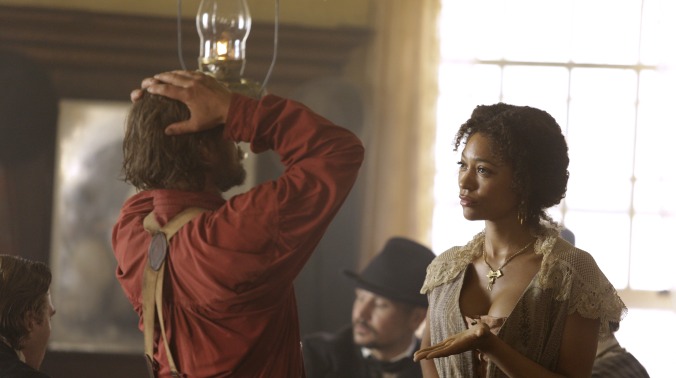
Folks, it’s not every day you see Steve Zahn get blown in half with a cannon. The gratuitously gory death of Zahn’s drunken ruffian Chase, toward the end of an episode that features a lot of accidental sex jokes, intrigue, and violence, cemented my main tonal reference point for The Good Lord Bird: It’s a version of Quentin Tarantino’s period movies that actually takes history seriously, and has complex things to say.
I swear, I mean this as a compliment, even if you hate Tarantino. There’s a very particular blend of wry comedy and grotesqueness that is commonly associated with his work, best exemplified by the Nazi slaughter at the end of Inglourious Basterds—and although he often misses the mark, the very end of “A Wicked Plot” absolutely nails it. To be more specific: The moment when Brown returns to the show in the middle of a firefight and, instead of focusing on the battle at hand, becomes obsessed with the state of Onion’s soul made me absolutely lose it.
Brown is notably absent from most of this episode, which is maybe important to establish Onion as the protagonist of the show but also feels a bit premature—Ethan Hawke is so electric that an episode without him just feels lackluster. Instead, Joshua Caleb Johnson has to ground “A Wicked Plot” as Onion falls into sin. After a misunderstanding on the road telling some passersby that he “sells trim,” Onion and Bob are brought to Pikesville, Missouri, where Onion becomes a worker at a brothel.
Onion’s time in Pikesville mostly involves an entirely new cast of characters; even Bob is missing for most of the episode, somewhere in the town’s slave pen. Instead, in addition to Caleb, Onion hangs out with Pie, one of the residents of the brothel who takes him under her wing. Like Onion, Pie is a survivor. Unlike Onion, she’s ruthless, up to and including selling out the leaders of Pikesville’s nascent slave uprising in order to secure some money for herself—something she’s only able to do because Onion, deferential to all forms of authority, immediately offers up the goods.
The goods, in this case, is Sibonia, a woman pretending to be incapacitated in order to mask her fierce intellect, principles, and careful planning. She asks Onion to forge documents that will be instrumental in her plan, but he instead tells Pie, allowing his fear to drive him. Played with steely resolve by Crystal Lee Brown, Sibonia is immediately compelling as a potential leader, refusing to back down when confronted with the town’s version of pioneer justice. In the interrogation scene, Sibonia seems styled to look like a 20th century revolutionary, with a shawl reminiscent of an ammo belt and a head covering the color of a beret. She is, in many ways, reminiscent of Brown himself.
Still, we don’t spend quite enough time getting to know the central characters in Pikesville—characters like the town’s priest, who seems to have a past relationship with Sibonia, but mostly talks past her in their big scene. Instead, director Kevin Hooks communicates that past in a shot of their hands touching as they begin to pray. It gestures toward the themes of the episode—the contrast between sticking to your principles and the sheer need for survival—without fully interrogating them. (Consider: Other moments, like Bob nobly sacrificing himself so that Onion could escape, feel a bit out of nowhere.)
Generally speaking, this episode feels like a bit of a lull, but Brown’s absence adds to the sense of him as a mythical figure, appearing, disappearing, and working a form of magic outside of human comprehension. (Notably, Steve Zahn’s Chase regales the people of Pikesville with the made-up story of how he killed John Brown, contributing to Brown’s legend in his own time.) Brown is more often a force of nature than he is a real person—presenting a problem for interpretation that The Good Lord Bird is going to need to dig into going forward. Is John Brown, insane? Or is he, like Sibonia, pursuing some greater goal? As historian James O. Horton put it in the 2000 PBS documentary John Brown’s Holy War, “We should be very careful about assuming that a white man who was willing to put his life on the line for Black people is of necessity crazy.”
Stray observations:
- “You have no problem with blood, unless it’s the blood of white folks.” She’s right!
- The climactic battle scene is a lot of fun, but the editing makes it hard to know where the cannon is and how tense we should feel about it gong off. Having said that, Onion’s narrated line “In that moment, like the rest of the country, Chase was divided in half” rules, as does the tossed-off, casual shot of the dead judge.
- “If we whites are wrong, please forgive us.”
- Obviously it is great to have Steve Zahn here, we simply love to see him. But he’s not in enough of the episode! Give us more Zahn!
5 Comments
I wasn’t too perturbed over Ethan Hawke’s diminished role in this episode – I love his scenery-munching John Brown, but he is very shouty, and a little goes a long way.Joshua Caleb Johnson more than held my attention in headlining this episode.
Agree 100%. I kept telling my wife how much I was hoping we don’t see him at all. In fact I think I found this episode more enjoyable than the 1st overall.
Alls I know is I’m incorporating ‘I hereby order you . . . to . . . GIT!’ to my rotation.
“And just like that Chase was like the country: split in half.”
A great line.
I want Steve Zahn back!Also, I hate Tarantino but love this show.